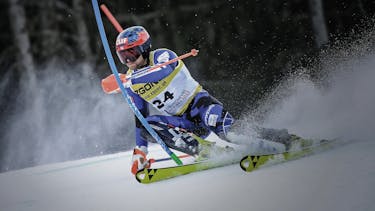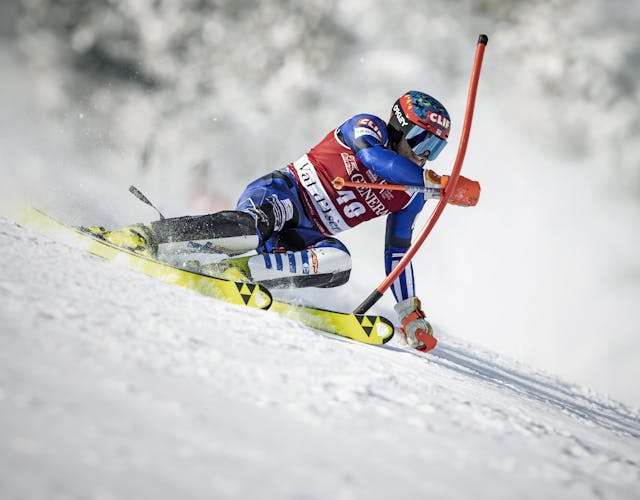AJ Ginnis from Greece is one of the most popular alpine ski racers at the moment. After being plagued by serious injuries, he has become inspiring because of his unusual career process, celebrated for his open and likeable manner, and, after his silver medal at the World Ski Championships in Courchevel, known by nearly every ski fan in the world. But in addition to his impressive successes, what really stands out is his unusual joie de vivre and his special relationship with the Fischer brand. We wanted to find out more about his story and who he is when he’s not skiing.
How would you describe your childhood and where did you spend it?
I don’t have a single complaint about my childhood. I grew up in the coastal town of Vouliagmeni, Greece, next to the ocean in a culture filled with sports and adventure. My family loved sports and I remember at a young age playing tennis, basketball, soccer, volleyball, water sports, track and field, and – last but not least – going skiing. Although my family was considered an alpine one by Greek standards, it doesn’t compare to real alpine families that grow up in the hearts of the Alps. I’m still the kind of guy that will pick a day in the ocean rather than a day hiking around the mountains and that’s just a direct reflection of my upbringing.
When did you start skiing?
I was born in November of 1994 and my parents put me on skis the following winter. But I didn’t start ski racing until I was 12 though.
How did your ski career start?
My ski racing career started when my dad and I moved to Austria for the winter season when I was 12 years old. He signed me up for the Kaprun Ski Club and that was it – things were rolling.
When did you first realize that professional skiing was possible?
At age 14, I started getting on the podium in some high-level Austrian races, and the following season I had the second-best slalom FIS points in the world for athletes born in 1994. At that point, I started realizing that I might actually be good at this whole skiing thing.
What have been the main milestones in your career so far?
The most memorable accomplishments were my second Europa Cup race which was in Levi, Finland, starting with bib 96 to ending up 11th (I was even 9th after the first run); the bronze medal at the 2015 World Junior Championships in Hafjel, Norway; my first ever World Cup points in Madonna Di Campiglio, Italy, back in 2016; the first ever World Cup points for Greece after changing the federation with an 11th place in Flachau, Austria; the first World Cup podium 2023 in Chamonix, France; and the World Champs silver medal in Courchevel, France, in 2023 as well. I would love to have been able to put down first World Cup win in Palisades Tahoe, USA, but I’m hoping that’ll come soon.
What have been the biggest setbacks in your career and/or life so far?
Unfortunately, I’ve dealt with a lot of these. Losing my father to suicide at age 18 probably tops the list talking about tough times. But six knee surgeries which included three ACL ruptures, one MCL rupture and a good amount of meniscus and cartilage damage doesn’t help either when you’re trying to compete against the best in the world. The good thing is, I learnt a lot from every single setback and difficult moments in my life which all contribute to the person I am today.
Has there been a result, success, or event so far that particularly stands out in any way?
That World Champs medal will be something that will live with me forever. The pressure I overcame and just rising to the moment for myself as well as for my country of Greece was truly special. It is the best moment in my career and making winter sports history for my country by winning its first ever winter medal (in Olympics and World Championships). It’s pretty tough to beat that.
Do you have plans for where you want to go next in your competitive skiing career?
My team and I want to keep pushing the boundaries of the sport and just see how far we can go. As long as that translates to fast skiing, I’m eager to see where that takes us.
How important is the team around you and how is it structured?
According to my mom, my team and the environment around me is the single most important thing for me and I don’t disagree with her. It’s no secret the US Ski Team developed me as a skier but for whatever reason I couldn’t perform under their leadership and was eventually cut from their team. That gave me the opportunity to setup my team with my vision. I turned to my best friends for coaching and we operate how we think is best. From the training to the brands we work with, it’s just us. It’s kind of like a business startup that hopefully keeps getting bigger and better.
How do you deal with the growing pressure that may have increased after your recent performances?
There’s no pressure that can compare to the standard that I demand from myself. No one can take away what my team and I have accomplished, and no one can influence my goals and my process moving forward. It’s funny because my first race starting in the world’s Top 30 was Courchevel. People were telling me “Oh, now that you’re in the 30 the lights get big and some athletes tend to hold back”. Every time I heard that I wanted to laugh and tell them that I’ve been waiting for this opportunity my entire life, there’s no way I’m letting it slip away. And even if I did make a mistake or whatever and fell out of the top 30, I know I’ll make my way back. I have some incredible people and sponsors in my corner and that’s all that matters to me.
How do you feel about the media in general?
The media has been awesome to me and my team and it’s a pretty important part of the world we live in. I wish I was a little better with my own social media platforms. And I hope I’ve given enough time and good content to the mainstream forms of media who have requested my time. Thank you to those outlets for reaching out and taking the time as well.
What was your first point of contact with the Fischer company? How would you describe your relationship with Fischer?
My father was the Fischer Representative in Greece and had his own Fischer store. So I grew up with and on the brand. I loved Fischer the same way I loved my favorite sports teams growing up, it was a strong bond. There were only two types of people for me on the mountain, those who skied on Fischer and the rest.
Do you feel like you have given up something because of professional skiing?
I’ve given up a lot. At a young age I moved away from my friends in Greece in order to be in Austria for a couple of months out of the year. And that trend has continued my entire life. I don’t see my family nearly as much as I’d want to, I’ve sacrificed relationships to be able to do this, and I live out of a suitcase. Again, I’m very blessed to have some incredible people in my life who understand what I’m trying to do and are always there for me. The fact that I moved back to Greece in May and was able to reconnect with friends who I hadn’t seen in more than 12 years and pick up right where we left off was truly emotional.
Is there anything you would like to change about skiing in general?
Consistency while keeping that high gear is the name of the game for me. I think we’re getting there though.
Looking back, is there anything you would do differently in your career so far?
My biggest regret is trying to ski speed at the age of 17. My first camp with the US Team I was put on speed skis and eventually destroyed my left knee in August of 2012. That crash and the severity of the injuries I sustained changed my entire life. That’s one thing I wish I could have avoided.
How do you spend free weekends?
During the season, [I spend them] resting and in the gym. During the summer I’ll try to escape with some friends to an island in Greece.
How does it feel that people often recognize you on the street now?
It feels silly. I don’t think that’s something I’ll ever get used to.
Are there any plans for after your active career?
I have an Economics degree from Dartmouth College, maybe I’ll use it. I have some ideas of what I’d like to do for sure, but nothing is certain at the moment.
What does it take to be fulfilled so that, looking back, you would describe your career as a ski racer successful?
After having so many surgeries you can’t help but reflect back on your career from time to time, especially when things are not going your way and the future looks unclear. So from early on I adopted the following ideology: For a kid that grew up 100 meters from the ocean in Greece, that’s not bad dude, could have been way worse. Of course I have dreams and goals that I’m chasing, but I’m extremely proud of everything I’ve accomplished on this journey so far.





